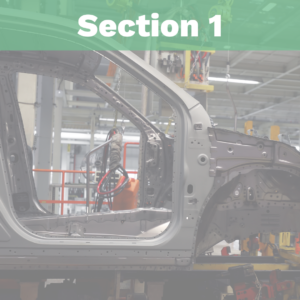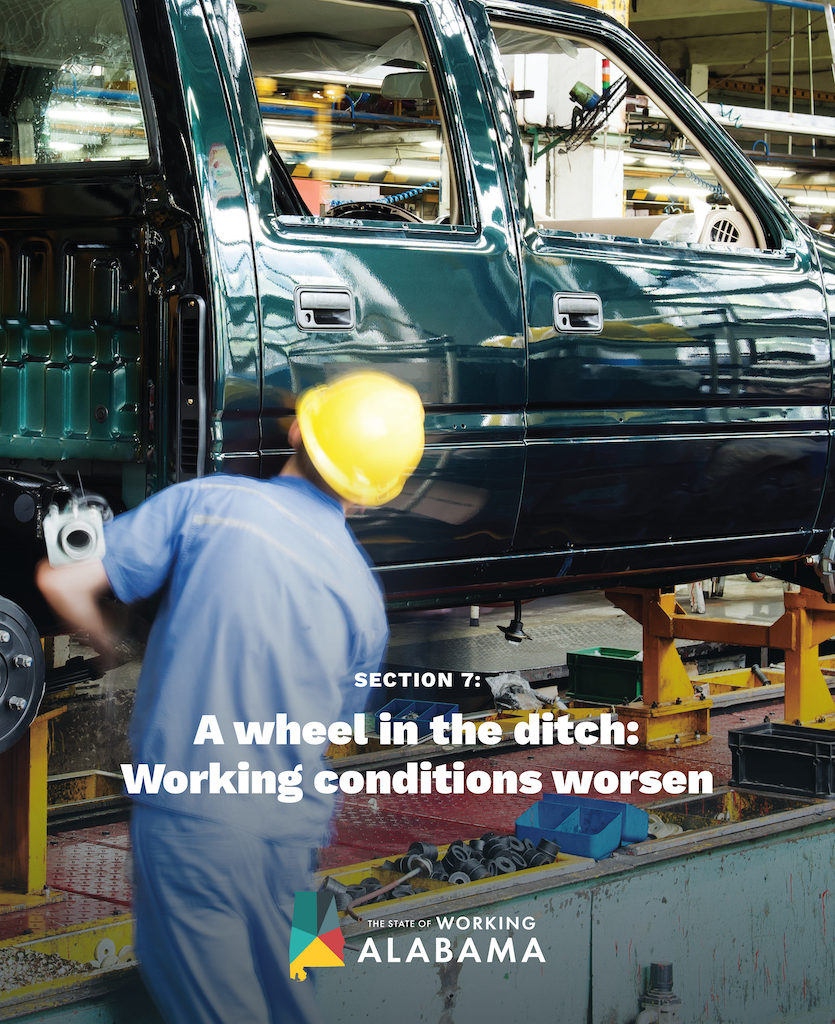Aside from declining wages and occupational segregation, some of Alabama’s auto employers are falling short with conditions on the factory floor. Specifically, media coverage and interviews with autoworkers at numerous facilities revealed the following problems with working conditions in Alabama’s auto plants:
– The tiered wage system. In an effort to reduce costs and increase profits, Alabama’s auto employers at Mercedes and other plants have instituted a tiered wage system, interviews found. Under such systems, workers who were hired more recently earn lower hourly pay and face higher health insurance costs than those who were hired more than 15 years earlier. Moreover, interviewees at Mercedes noted that autoworkers in the second tier face caps on their yearly wages. These caps are such that their maximum hourly pay rate is roughly 80% of the top rate earned by workers hired before the multitier system’s implementation. Even more troubling, temporary workers can earn less than half the hourly wage of a capped tier 1 worker, according to interviews. Because it ultimately holds down worker pay, the tiered wage system is likely a significant reason why auto industry pay has declined over the past 20 years.
Auto employers across the entire sector have cut wages significantly through the tiered system, including at plants in other states and plants staffed by workers who are represented by unions. United Auto Workers (UAW) contracts began including a multitiered wage and benefit system in 2007. Because companies’ motivations for cutting pay are so high, some autoworkers, including those at Mercedes, have been through multiple rounds of their employers offering five-figure payments to long-term workers to quit or retire, according to interviews. These moves have enabled employers to bring in lower-cost replacement workers and still save tens of thousands of dollars for each position replaced in the long run.
In addition, a tiered system divides the workforce and reduces worker organizing ability. It removes more experienced workers, who have greater familiarity with previous benefits and procedures, and replaces them with workers who lack the experience to evaluate the diminished wage and benefit structure against prior better compensation packages, according to interviews.
– Child labor. In a recent series of abuses detailed by state and national media, SL Alabama, which at the time was a majority–owned subsidiary of Hyundai, contracted out labor in its Greenville auto parts plant and used children as young as 13 to manufacture car parts.[101] Victims of child labor trafficking are often immigrants, which places them at even further risk of workplace abuse, and this was generally the case with the Hyundai supplier’s victims.[102] [103] When these illegal activities came to light and resulted in international outrage, Hyundai divested its ownership interest in the subsidiary.[104] UAW’s organizing director Oten Wyatt notes that the multitiered system allows this type of abuse to continue, in part because temporary workers have fewer protections than permanent employees.
– Unsafe working conditions and labor violations. A number of Alabama auto manufacturing plants also have habitually violated federal safety regulations. In 2017, a Bloomberg article highlighted some of the atrocious yet preventable deaths and injuries that had occurred within auto manufacturing facilities throughout the state, including suppliers for Honda and Mercedes facilities.[105] In 2010 alone, “workers in Alabama parts plants had a 50 percent higher rate of illness and injury than the U.S. auto parts industry as a whole.” [106] By 2015, “the chances of losing a finger or limb in an Alabama parts factory was double the amputation risk nationally for the industry, 65 percent higher than in Michigan and 33 percent above the rate in Ohio.” [107] And in 2017, “the incidence of traumatic injuries in Alabama’s auto parts plants remain[ed] 9 percent higher than in Michigan’s and 8 percent higher than in Ohio’s.” [108]
– Sudden, unexpected and arbitrary changes in pay rates. Significant changes detrimental to employees recently have taken place at multiple Alabama auto manufacturing facilities. For example, workers at Mercedes reported having Saturday and Sunday pay rates, previously paid at double (Saturday) or triple (Sunday) the regular hourly rate, reduced to their straight hourly wage. Further, worker interviews noted that some facilities have instituted complete overtime bans within the past year, sometimes with less than a pay period’s notice to workers who would experience declines in earnings because of these policy changes. Worker estimates of the financial impact of these changes state that they could cost up to $1,500 per pay period.
– Unfair discipline and capricious or discriminatory hiring and promotional decisions. Our interviews found that some workers have faced the use of much harsher discipline procedures, including potential dismissal for one-time, non-dangerous violations of uniform requirements. Workers also spoke about management punishing coworkers unfairly. In one instance, a high–performing assembler was written up to keep him from transferring to another team, with a higher–paying role, within the same facility to avoid a workflow slowdown on his then-current station. In other instances, interviewees said, supervisors gave conflicting or baseless rationales for promotional decisions that appeared to hold back Black workers and benefit specific white workers who were close to management and had less seniority, less training and more mistakes on the job.
– Missing appeals process for disciplinary action. In some plants, discipline appeals processes have been eliminated for newer workers, our interviews found. Workers said the original appeals process included a panel review by other wage workers, rather than just salaried supervisors, but this process since has been eliminated. As a result, workers no longer have direct input into a process meant to prevent overly harsh or pretextual dismissals. These changes also have removed protections against targeted or otherwise unfair discipline for newer workers, interviewees said. This eliminates a key aspect of due process that can mean the difference between someone keeping or losing their job.
Additional sections
 Executive summary
Executive summary
 Introduction
Introduction
 The high stakes and big bet on Alabama’s auto industry
The high stakes and big bet on Alabama’s auto industry
 The ways the bet on auto benefited Alabama
The ways the bet on auto benefited Alabama
 A wheel in the ditch: Autoworkers see falling pay
A wheel in the ditch: Autoworkers see falling pay
 A wheel in the ditch: Pay gaps and occupational segregation
A wheel in the ditch: Pay gaps and occupational segregation
 A wheel in the ditch: Economic impact of falling wages and the pay gap
A wheel in the ditch: Economic impact of falling wages and the pay gap
 The auto industry and Alabama’s low-road economic development approach
The auto industry and Alabama’s low-road economic development approach
 What we should do next
What we should do next
 Research design and methodology
Research design and methodology
[101] Josh Moon, “As child labor scandal grows, Hyundai provides details of a crackdown on suppliers,” Alabama Political Reporter (Feb. 14, 2023), https://www.alreporter.com/2023/02/14/as-child-labor-scandal-grows-hyundai-provides-details-of-a-crackdown-on-suppliers.
[102] Mica Rosenberg, Joshua Schneyer & Kristina Cooke, “Special report: How A fake ID let Hyundai suppliers use child labor in Alabama,” Reuters (April 27, 2023), https://www.reuters.com/world/us/how-fake-id-repeatedly-enabled-hyundai-suppliers-employ-child-labor-alabama-2023-04-27.
[103] Tom Spiggle, “Why Workplace Abuse Plagues Undocumented Workers,” Forbes (Dec. 10, 2021), https://www.forbes.com/sites/tomspiggle/2019/08/22/why-workplace-abuse-plagues-undocumented-workers.
[104] United Auto Workers, “UAW condemns Hyundai’s decision to sever ties with its Alabama suppliers” (Oct. 21, 2022), https://uaw.org/uaw-condemns-hyundais-decision-sever-ties-alabama-suppliers.
[105] Peter Waldman, “Inside Alabama’s Auto Jobs Boom: Cheap Wages, Little Training, Crushed Limbs,” Bloomberg Businessweek (March 23, 2017), https://www.bloomberg.com/news/features/2017-03-23/inside-alabama-s-auto-jobs-boom-cheap-wages-little-training-crushed-limbs.
[106] Ibid.
[107] Ibid.
[108] Ibid.


